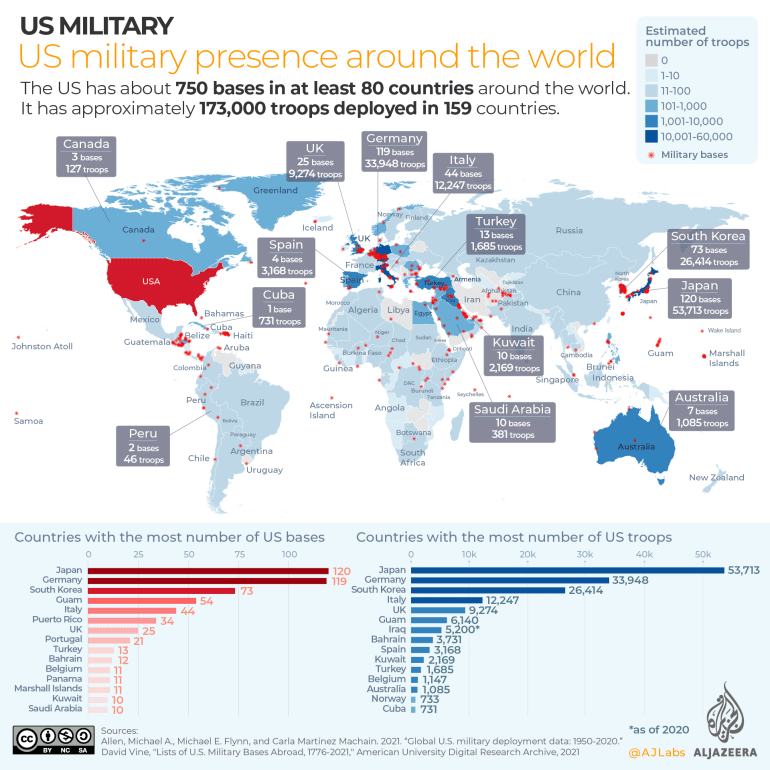More languages
More actions

U.S. imperialism consists of policies aimed at extending the economic, political, cultural and military influence of the United States over areas beyond its boundaries, especially considering the Marxist definition of imperialism as originally defined by Lenin, but other aspects of imperialism as well, such as military operations and economic terrorism.
Doctrines followed (and sometimes proposed by the U.S. government itself since its inception) such as Manifest Destiny, Monroe and his Roosevelt Chorolary, the Big Stick, the National Security Doctrine, etc. and events such as the conquest of the West, the Mexican war, the banana wars, the Spanish-Cuban-American war and, more recently, the Vietnam War, the U.S. blockade against Cuba, the war in Afghanistan, etc. have made "American imperialism" a term accepted by the greater part of the international community.
The United States has interfered in the elections of 45 foreign countries[1] and organized over 132 CIA and military interventions around the world since 1890,[2] in addition to almost 100 before 1890.[3]
History
Between 1798 and 1827, the United States participated 23 military interventions, including in Greece, Libya, and Cuba. It did 71 interventions between 1831 and 1896 on all continents except Antarctica. The U.S. did 40 interventions between 1898 and 1919.[3]
Death toll
Austin Murphy estimates that U.S. imperialism and colonialism have intentionally killed over 11 million unarmed civilians, including five million indigenous people, a million Filipinos, 500,000 German and Japanese people, over 500,000 Indonesians, over a million each of Vietnamese, Iraqis, and Koreans, and over 500,000 Cambodians. This is a low estimate and Murphy acknowledges that the deaths of indigenous people in North America alone is over 18 million.[4]
Military bases
The United States has 750 military bases around the world in at least 80 countries. It also has 173,000 troops deployed in foreign countries. The country with the most U.S. military presence besides the U.S. itself is Japan, with 120 bases and over 53,000 troops. Japan is followed by Germany and then South Korea.[5]
By country
Iraq
The U.S. bombing of Iraq directly killed approximately 50,000 civilians. The U.S. sanctions and destruction of infrastructure and farmland caused over a million civilians, including many civilians.[4]
Philippines
When the United States seized the Philippines from Spain in 1898, most of its territory was controlled by a Filipino resistance army. The United States fought a war against the resistance until 1902 and sporadic uprisings continued until 1915. The United States killed over 600,000 people on the island of Luzon alone and hundreds of thousands more died from starvation and disease throughout the Philippines.[4]
Vietnam
The United States killed at least a million Vietnamese civilians with bombing campaigns in the Vietnam War. The U.S. killed about ten times as many civilians as actual Viet Minh soldiers during the bombings. The total number of Vietnamese people killed, including soldiers and civilians killed indirectly through starvation, may be more than three million.[4]
References
- ↑ Dov Levin (2020). Meddling in the Ballot Box. Carnegie Mellon University.
- ↑ Zoltán Grossman. U.S. Military Interventions since 1890: From Wounded Knee to Syria. [PDF]
- ↑ 3.0 3.1 Roxanne Dunbar-Ortiz (2014). An Indigenous Peoples' History of the United States: 'US Triumphalism and Peacetime Colonialism' (p. 162). ReVisioning American History. [PDF] Boston: Beacon Press Books.
- ↑ 4.0 4.1 4.2 4.3 Austin Murphy (2000). The Triumph of Evil: 'Introduction' (pp. 22–24, 37–40). [PDF] European Press Academic Publishing. ISBN 8883980026
- ↑ "Mapping U.S. Imperialism" (2022-06-06). Monthly Review. Archived from the original on 2022-06-14. Retrieved 2022-06-17.
